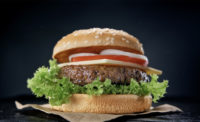According to the New York Times, Wilson said that Tyson had previously declined to sell beef trimmings to Costco because of its testing requests. Tyson did not respond to those claims, but a spokesman said that the company does not prohibit grinders from conducting their own testing on top of the testing that Tyson already performs.
The USDA has long promoted the additional testing from grinders, though some suppliers have been reluctant to let grinders test their products, the Times reported.
The Times has been getting responses from the industry ever since it first ran its report on a woman who was paralyzed after eating an E. coli-tainted hamburger. Cargill, the company that made the hamburger in question, released a statement that noted that it requires its suppliers to test their trim and take other steps to prevent contamination. “Over the past 10 years, Cargill has invested $1 billion in ongoing meat science research and new food safety technologies and interventions,” the company told the paper.
Source: New York Times
World Trade Organization may get involved in U.S., Canadian trade disputes
Reuters is reporting that the United States will request the World Trade organization to end a dispute between the United States and the European Union over the EU ban on U.S. chicken imports. Talks between both sides at the WTO have not resolved the 11-year dispute over EU restrictions on chlorinated-treated poultry."It is expected that the U.S. will seek a WTO panel over chicken in the coming days," one diplomat with knowledge of the case told Reuters.
In another case, Canada has asked the WTO to resolve a dispute over the U.S. country-of-origin labeling law, which the country says has hurt livestock exports to the United States. Reuters Canada reports that cattle exports have dropped 31.7 percent and hog exports 34.6 percent through the first half of the year.
"Canadian farmers and ranchers produce top-quality food and they are facing unfair discrimination because of (the) legislation," said Canada's agriculture minister, Gerry Ritz, in a statement on Wednesday announcing the WTO request. He added that he objects to the COOL law because it does not recognize the integration of the North American livestock market.
"The industry on both sides of the border agree we need each other," he said.
The National Cattleman’s Beef Association issued a statement about the WTO request, which said in part, “Canada’s decision to move forward with their complaint against U.S. COOL regulations is unfortunate, due to the potential retaliatory action that could be taken against U.S. beef. Since COOL was first proposed, we’ve continued to have concerns about its potential implications on our relationship with our top two trading partners—not to mention its impact on domestic feeder cattle markets at our borders to the North and South.
“The U.S. imports and adds value to Mexican and Canadian livestock through our feedlots, processing and infrastructure; and we export this value-added finished product back to Mexican and Canadian consumers. Any disruptions to either of these markets will have a significant economic impact on our industry. Unfortunately, it’s becoming clear that COOL has damaged these critically important trading relationships, and is not putting any additional money into the pockets of cattlemen.”
Source: Reuters, Reuters Canada, NCBA
Man sentenced to 7 years in chicken export scam
Alexander Legault, a former Louisiana resident, has been sentenced to seven years in prison for tricking the Egyptian government into paying more than $7 million for a shipment of frozen chicken that was never delivered.The government had agreed to buy more than 5,000 metric tons of frozen chicken from Legault and wired the money to a corporate account, AP reports. Legault falsified documents to make it appear that the chicken was on board a Swedish ship that was bound for Egypt. Legault later moved from Louisiana to Canada, but he indicted for the scam in 1986 and was arrested and deported last year.
Source: Associated Press



